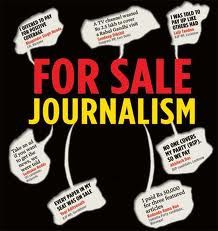 DELHI:चुनावों समेत कई मौकों पर पेड न्यूज छापकर पैसा बनाने वाले अखबारों पर अब सरकार अपनी नजर तीखी करने वाली है| खबर आ रही है कि पेड न्यूज को लेकर मनीष तिवारी के नेतृत्व वाला केंद्रीय प्रसारण मंत्रालय गंभीर है| सरकार पीआरबी एक्ट में बदलाव करके पेड न्यूज को गंभीर अपराध की श्रेणी में लाने की तैयारी कर रही है| पेड न्यूज में पकड़े जाने के बाद अखबार की मान्यता भी समाप्त कर दी जाएगी|
DELHI:चुनावों समेत कई मौकों पर पेड न्यूज छापकर पैसा बनाने वाले अखबारों पर अब सरकार अपनी नजर तीखी करने वाली है| खबर आ रही है कि पेड न्यूज को लेकर मनीष तिवारी के नेतृत्व वाला केंद्रीय प्रसारण मंत्रालय गंभीर है| सरकार पीआरबी एक्ट में बदलाव करके पेड न्यूज को गंभीर अपराध की श्रेणी में लाने की तैयारी कर रही है| पेड न्यूज में पकड़े जाने के बाद अखबार की मान्यता भी समाप्त कर दी जाएगी|
कुछ इस तरह के ही बदलाव की तैयारी सूचना और प्रसारण मंत्रालय चुनावा आयोग के साथ मिलकर कर रहा है| पेड न्यूज में दोषी पाए जाने दो साल की सजा का भी प्रावधान किया जा रहा है| नीचे इस संदर्भ में टीओआई में प्रकाशित खबर|
‘Paid news’ offenders may lose registration’
NEW DELHI: The government is considering amendments in the Press and Registration of Books (PRB) Act to make “paid news” in the media an offence which may attract a monetary fine or, in extreme cases, cancellation of the publication’s registration.
The I&B ministry’s move to review the Act comes in conjunction with the Election Commission’s proposal to make “publishing or abetting of publishing” of “paid news” an electoral offence that may even led to two-year imprisonment for the offender.
Although what really constitutes “paid news” is not been defined, currently the attention is on favourable or unfavourable electoral estimates that have been paid for. However, it would also include similar “paid news” on other subjects if it is not clarified that the impugned article is an “advertorial” or a “supplement”.
An I&B ministry source said: “Just as a candidate can be held responsible for giving material for paid news, the publication should also be held responsible for accepting such material.” However, with the Lok Sabha polls barely a year away, it’s doubtful whether amendments to the legislation will get Parliament’s nod.
The ministry is also considering changes in the Directorate of Audio Visual Publicity (DAVP) rules to block DAVP advertisements to publications that have attracted a repeated censure for “paid news” from the Press Council of India. Several small and medium media organizations are heavily dependent on DAVP ads and this clause would act as a major disincentive.
Committees appointed by the Election Commission has been unearthing a number of instances of “paid news” recently, including over 400 alleged instances of “paid news” during the December 2012 Gujarat election.
The parliamentary standing committee reviewing the PRB Act has already recommended that an annual statement record of income from advertisements should be filed by publications. Rapping the I&B ministry for not providing a suitable mechanism for checking the menace of “paid news”, the panel headed by Rao Inderjit Singh said: “The committee need hardly emphasize that having the provision of furnishing details of advertisement revenue by the publications would definitely address the menace of paid news to a great extent. The committee express their serious anguish that the ministry has missed out an opportunity to curb the menace of paid news.”
The legislation has now been sent back to the ministry for suitable amendments.
In 2011, the EC had recommended amendments to the Representation of People Act 1951 which would make publishing “paid news” for furthering the prospect of election of any candidate or for prejudicially affecting the prospect of election of any candidate an electoral offence with punishment of a minimum of two years imprisonment.